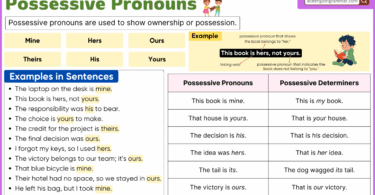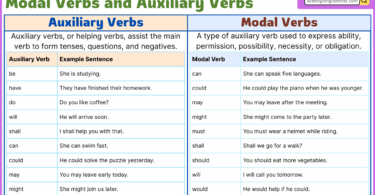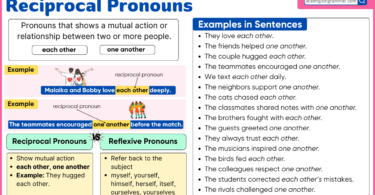Understanding pronouns is essential for mastering English grammar. One specific type, reflexive pronouns, plays a crucial role in sentence structure and meaning. These pronouns are used when the subject and object of a sentence are the same, adding clarity and emphasis. In this blog post, we will explore reflexive pronouns, their correct usage, and common mistakes learners should avoid.
A reflexive pronoun is a pronoun that refers back to the subject of the sentence and ends in -self or -selves (e.g., myself, yourself, himself).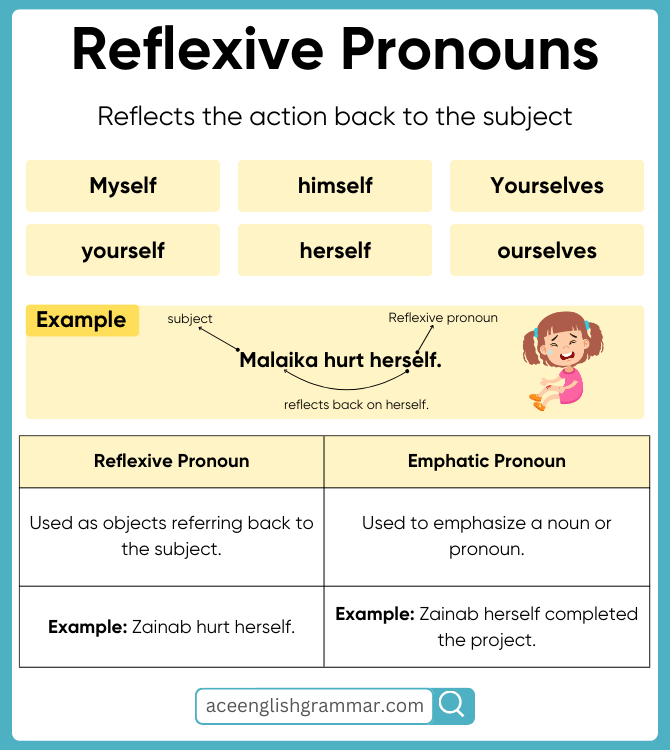
These pronouns show that the action is reflected back to the subject, meaning the subject is both performing and receiving the action.
Table of Contents
List of Reflexive Pronouns
Here is a complete list of reflexive pronouns:
| Singular | Plural |
|---|---|
| Myself | Ourselves |
| Yourself | Yourselves |
| Himself | Themselves |
| Herself | Themselves |
| Itself | – |
Rules for Using Reflexive Pronouns
✅ When the subject and object are the same:
- Aisha looked at herself in the mirror.
Aisha is both the subject and object, so “herself” is used.
✅ To emphasize the subject:
- Yusuf himself fixed the car.
“Himself” emphasizes that Yusuf did the action alone.
Examples of Reflexive Pronouns in Sentences
Reflexive Pronoun as Objects
- Fatima taught herself how to bake.
She is both the doer and receiver of the action.
Reflexive Pronoun After Prepositions
- Ahmed spoke to himself in the mirror.
“Himself” refers back to Ahmed.
Reflexive Pronoun in Idiomatic Expressions
- She found herself in a difficult situation.
The phrase means she realized something unexpectedly.
Examples Sentences of Reflexive Pronouns
Here are 25 short example sentences using reflexive pronouns:
- I hurt myself while cooking.
- She introduced herself to the guests.
- He blamed himself for the mistake.
- We enjoyed ourselves at the picnic.
- They taught themselves French.
- The cat cleaned itself after eating.
- You should believe in yourself.
- He made the cake himself.
- I reminded myself to call Ali.
- She dressed herself quickly.
- The kids entertained themselves.
- The baby rocked itself to sleep.
- We prepared ourselves for the test.
- You must take care of yourself.
- They fixed the car themselves.
- The dog injured itself.
- He found himself in trouble.
- I locked the door myself.
- She challenged herself to run faster.
- We cleaned the house ourselves.
- The machine stopped by itself.
- You should introduce yourself to the class.
- They organized the event themselves.
- He prided himself on his achievements.
- I gave myself a day off.
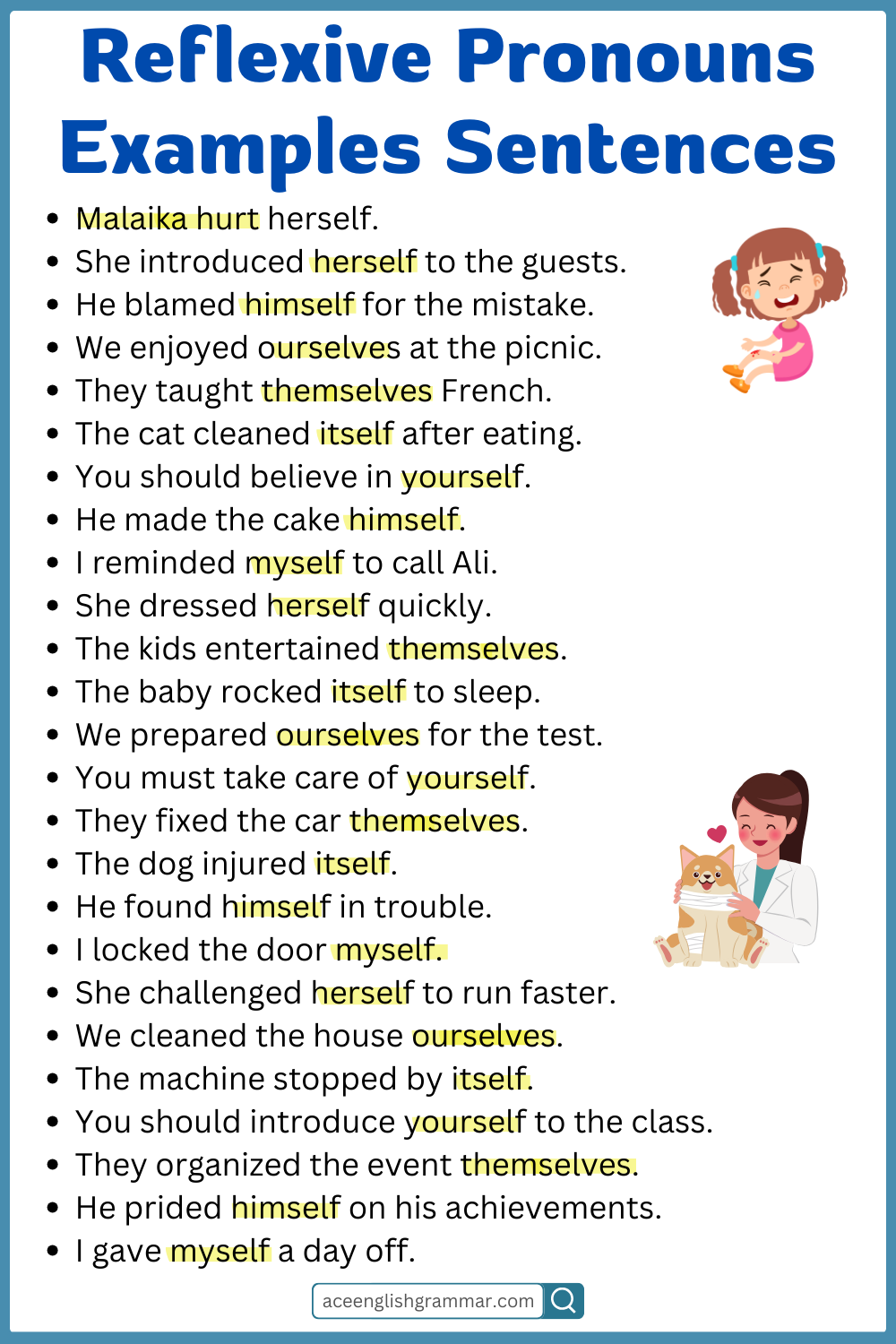
Reflexive vs. Emphatic Pronoun
| Reflexive Pronoun | Emphatic Pronoun |
| Used as objects referring back to the subject. | Used to emphasize a noun or pronoun. |
| Example: Zainab hurt herself. | Example: Zainab herself completed the project. |
Why Are They Important in English?
- Ensure clarity in sentences.
- Help avoid repetition by referring back to the subject.
- Improve fluency in writing and speaking.
Common Mistakes with Reflexive Pronouns
- ❌ Incorrect: Ali and myself went to the market.
- ✅ Correct: Ali and I went to the market.
(Use “I” instead of “myself” as the subject.)
- ❌ Incorrect: She gave the book to myself.
- ✅ Correct: She gave the book to me.
(Reflexive pronoun should not replace standard object pronoun.)
FAQs
Use reflexive pronoun when the subject and object of a sentence are the same. They are also used for emphasis.
No, reflexive pronoun cannot replace subject pronoun. For example, “Myself went to the store” is incorrect. The correct sentence is “I went to the store.”
Reflexive pronoun act as objects referring back to the subject, while emphatic pronoun is used only to emphasize the subject.
No, “myself” should not replace “me” unless it is reflexive. For example, “She told me” is correct, but “She told myself” is incorrect.
Yes, reflexive pronouns are used in both formal and informal writing, but they should not replace standard subject or object pronouns.
Conclusion
Reflexive pronouns are essential in English grammar, ensuring clarity and reducing repetition. By understanding their correct usage, learners can improve their fluency and avoid common errors. Keep practicing, and soon, using reflexive pronoun will become second nature!
Download PDF
Click bellow 👇👇 to download a PDF version of this guide for future reference.
Read More

